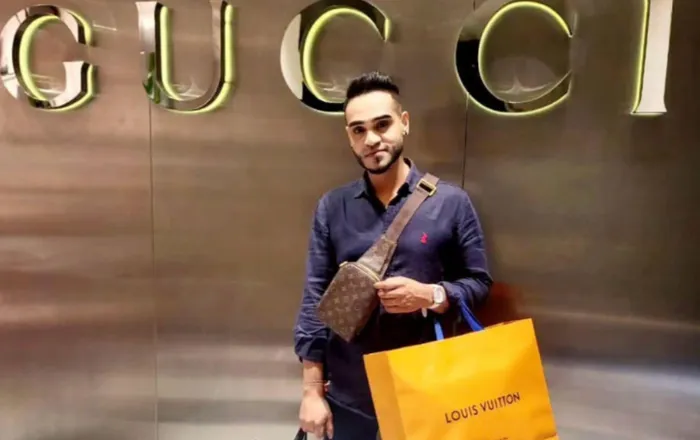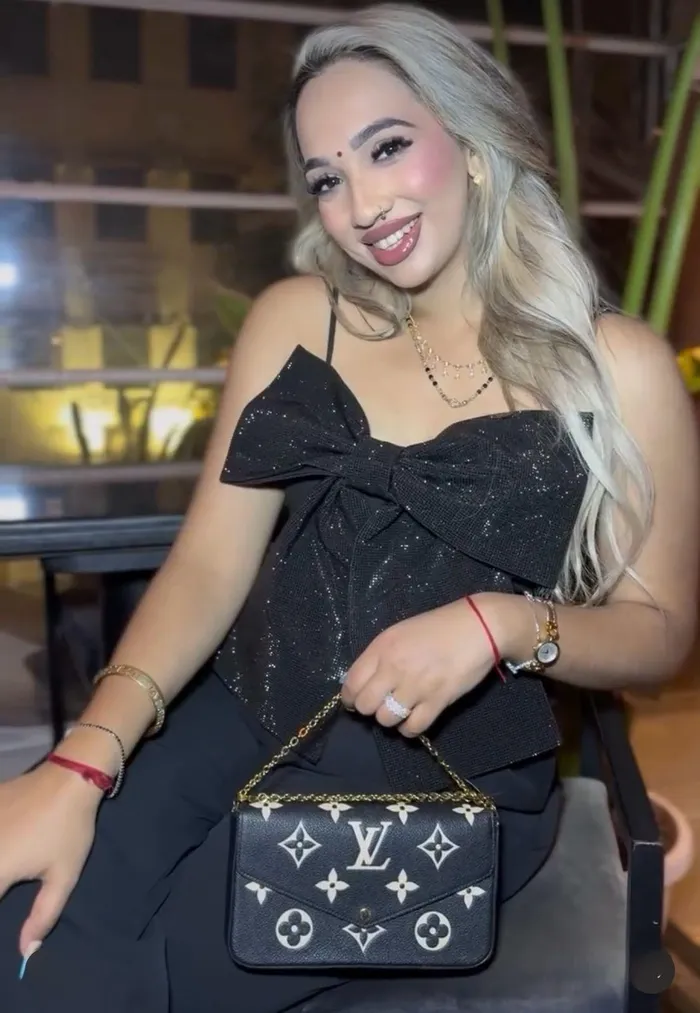
Theshen Naicker.
Image: Instagram/screengrab
DAYS after US president Donald Trump slapped a 125% tariff on Chinese imports, China took to social media, ‘exposing’ the location where luxury brands, such as Gucci, Louis Vuitton, Hermes, Coach and Jimmy Choo and many more are manufactured.
Chinese content creators, influencers, and even factory workers took to TikTok to ‘expose the lie’ about overpriced luxury brands.
“Some say as long as there’s a tag saying ‘made in China’, the bag can never be luxury.
“However, in fact more than 80% of the luxury bags in the world are made in China. But those luxury brands just won’t acknowledge that they take finished bags from China factories back to their own factories and just do a repackaging, and logo installation, that way the bags will appear at their boutiques as ‘made in Italy’ or ‘made in France’.
“You know those sophisticated European countries that make you feel mysterious and luxurious.”
The content creator 'Bagbestie1' went on to say that many people considered something ‘made in China’ less prestigious as compared to European countries.
“Welcome to the real world. Now you see those bags are ‘made in China’ by our intelligent Chinese artisans, let's not be poisoned and misled by the market campaign any longer,” said the creator.
After the video went viral on social media, many South Africans have been left wondering about their expensive luxury brand ‘investments’.
Theshen Naicker, an actor and entertainer, said he found it difficult to believe the online claims.
“Don’t believe everything you see on social media. We need to take into consideration the timing of these allegations, which is the tariff war with China vs US, which makes one question the validity of the statements made.
“I love luxury bags and I have a collection of my own which consists of Louis Vuitton, Gucci and Chanel. These brands made only 100 bags in each design for the global market, so economically it does not make sense that it would be mass produced in China,” said Naicker.
He said the history of the brand's journey sealed the deal of authenticity for him.
“A lot of people buy fake bags, and I have nothing against that but I carry authentic bags because I love the brands. It’s such a disrespect to these brands, for statements to be made against the authenticity of their products.
“We as buyers, immerse ourselves in the journey of these brands and we know their history, such as the factory and design process. So it’s hard to believe that these statements by China could be true,” he said.
Naicker is on a database of clients who buy luxury bags.
“There are a few of us, and we receive messages when new products arrive. When we buy our bags we receive receipts of validity. These bags start from R100 000 and go to as much as R400 000.
“What's disheartening about these allegations is that we work hard to buy these luxury brands. I know my journey started 15 years ago, and it was difficult to even be able to afford a single tie. But that's how I started my collection of luxury brands. If it turns out that the allegations are true, I will be shocked and upset. But for now, we should wait for the brands' official statements,” he said.
Abigail Nadar-Nepaul, an attorney and TV personality, said she was not worried about the claims.
“I have been gifted many luxury bags over the years and they were all bought in India. I love the bags. I wear them proudly, but what I appreciate about them is that they go up in value every year.
“I have watched the TikTok videos about China ‘exposing’ yhe many luxury brands and the fact that these bags are made in China. I have always known that there are different levels to the manufacturing process and that the chances are very high that these bags were made in China and then shipped off to the different high-end cities to have the different labels attached to them. But this was never confirmed," said Nadar-Nepaul.
Now that it has been confirmed, she saw no problem with the claims as it meant that luxury bags could be made available to the broader public.
“People who are also deserving of these beautiful bags and pieces and accessories. So I'm very happy about that. I also look forward to my next shopping spree in China because now I'm not just limited to one luxury purchase. I could shop for quite a lot more and so can more people. So it really just evens out the long field and makes luxury accessible to a lot more people.
“I think with the news coming out, that is the universe's way of saying everyone deserves good things in life. Here you go. If you have been waiting for a bag like this for a very, very long time and possibly saving up for it, you may now already have the money to buy not just one, but more than one luxury item,” she said.
Nadar-Nepal said she was glad to see China ‘expose’ the claims.
“This makes me very excited, I stand with this entire exposure. It really is levelling out playing fields, not just physically, but spiritually as well. I think God is saying, let's give more people a chance at a better life and that works for me,” said Nadar-Nepal.
Asharia Parsad, a businesswoman and TV personality, said she had no issues with luxury products being made in China but took exception to the expensive brands hiding the facts.
“As a general consumer I’m aware that most items we purchase are made in China, and have no issue with it. Having items made in China does not mean it’s of inferior quality to me.
“However, as a Louis Vuitton connoisseur, I am aware that the luxury bags and items are marketed to be crafted in France. The lack of transparency displayed is what I have an issue with. If a bag I purchased is marketed as “made in France”, it should not be otherwise - especially for the above premium price. This controversy highlights broader concerns about transparency and fairness in the luxury goods market,” said Parsad.

Asharia Parsad.
Image: Instagram/screengrab
Sanisha Packirisamy, an economist, said these claims could jeopardise the luxury brand industry.
“Allegations that Chinese factories are behind luxury goods marketed as ‘European-made’ threaten the US$330 billion luxury industry (Straits Research) by undermining the prestige that drives high prices.
“This could dampen demand for brands like Gucci or Chanel, especially in major markets like the US and China, while fueling China’s grey market and domestic labels. Meanwhile, the steep US tariffs on Chinese goods may inflate costs for brands using Chinese production, raising prices or cutting profits. Even if some claims are overstated, the perception of deceit could reshape supply chains and consumer trends, impacting trade and employment globally,” said Packirisamy.